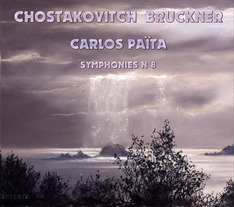Der 1932 in Buenos Aires geborene Dirigent Carlos Païta ist heute so gut wie vergessen und zu Lebzeiten – er starb 2015 – war er auch nur Insidern bekannt. Den Unterricht an Konservatorien fand er zu restriktiv und einengend. Er studierte Dirigieren bei Artur Rodzinski und ging dann immer seinen eigenen Weg abseits der großen Klassikströme. Er gründete sein eigenes Orchester, das Philharmonic Symphony Orchestra in London und nahm vor allem für sein eigenes Label Lodia auf.
Das Label Le Palais des Dégustateurs veröffentlicht jetzt die nie zuvor publizierte Liveaufnahme der Achten von Shostakovich aus dem Jahre 1981 sowie die zuvor bei Lodia erhältliche Achte von Bruckner.
In der mittleren der drei Kriegssymphonien von Shostakovich werden Gefühle durch Bilder vermittelt, Bilder, die Shostakovich in Ton setzte wie eine Filmmusik, zu der man sich die Handlung ganz einfach vorstellen muss. Païta hilft dem Zuhörer dabei mit ungemein viel Suggestivkraft. Er tut es ernsthaft und musikalisch sehr anspruchsvoll, ohne jede Effekthascherei, dafür aber mit packender Intensität. Das Philharmonic Symphony Orchestra wartet mit einer grandiosen Leistung auf.
Die zweifellos gute Aufnahme der Achten von Shostakovich steht noch im Schatten der Achten Bruckner. Gleich in den ersten Takten dieser durchgehend spannungsvollen und hochkarätigen Aufnahme aus dem, Jahre 1982 spürt man, dass das Philharmonic Symphony Orchestra nicht nur spielt, sondern von einer starken Hand geführt wird. Die Energie, die Carlos Païta in die Symphonie bringt, ist phänomenal.
Neue Farben, neue Akzente, neue Kontraste werden belebt durch eine ungewöhnliche Spontaneität, die jede Feierlichkeit, jedes Pathos, jeden mystifizierenden Charakter vermeidet. Im kraftvoll und klanglich geschärften Scherzo mit seinem ländlichen, aber hier keinesfalls rustikal klingenden Trio arbeitet Païta die rhythmischen Konturen sehr gut heraus und differenziert die Musik sowohl in den Klangfarben als auch in den Klangwerten und dynamischen Unterschieden. Das ebenso tiefschürfende wie kraftvoll-vitale Adagio hat einen mustergültigen Spannungsverlauf und eine immer durchgehend packenden Kontrolle der Dynamik. Da kommt bei durchaus gemäßigtem Tempo viel Bedeutsamkeit auf. Nirgend verfällt die Musik in Lethargie, sie wird ständig dynamisch belebt.
Das Finale der Achten ist Bruckners letztes. In der Neunten hat er keines mehr geschrieben. Hat er dies voraus geahnt, als er all jene Energie hier bündelte, als er der Wucht des ersten Themas einen erhabenen Choral gegenüberstellte und aus einer Vielfalt von Motiven eine regelrechte Apotheose komponierte, die Carlos Païta spannungsvoll und dramatisch, streckenweise sogar regelrecht explosiv gestaltet? Aber das führt nicht zu einer schnellen und oberflächlichen Interpretation, ganz im Gegenteil. Dieses Finale ist großartig strukturiert, sehr kohärent und überzeugt mit einer fesselnden Dramaturgie.
Mithin ist dies eine exzellente Hommage an einen großen Dirigenten, an den zu erinnern es sich lohnt.
Born in Buenos Aires in 1932, the conductor Carlos Païta is almost forgotten today, and during his lifetime – he died in 2015 – he was known only to insiders. He found the teaching at the conservatories to be too restrictive and narrow-minded. He studied conducting with Artur Rodzinski and then went his own way, away from the mainstream of classical music. He founded his own orchestra, the Philharmonic Symphony Orchestra in London, and recorded mainly for his own label, Lodia.
Le Palais des Dégustateurs is now releasing the never-before-heard live recording of Shostakovich’s Eighth from 1981, as well as Bruckner’s Eighth, previously available on Lodia.
In the middle of Shostakovich’s three war symphonies, emotions are conveyed through images, images that Shostakovich sets in sound like a movie soundtrack to which one simply has to imagine the action. Païta helps the listener with an enormous power of suggestion. He does this in a very serious and musically sophisticated way, without any gimmickry, but with gripping intensity. The Philharmonic Symphony Orchestra delivers a magnificent performance.
The undoubtedly fine recording of Shostakovich’s Eighth still stands in the shadow of Bruckner’s Eighth. From the very first bars of this consistently exciting and first-rate recording from 1982, one senses that the Philharmonic is not just playing, but being led by a strong hand. The energy that Carlos Païta brings to the symphony is phenomenal.
New colors, new accents, new contrasts, animated by an unusual spontaneity that avoids any solemnity, any pathos, any mystifying character. In the powerful and tonally sharpened Scherzo, with its pastoral but by no means rustic-sounding trio, Païta works out the rhythmic contours very well and differentiates the music both in terms of tonal colors and tonal values and dynamic differences. The Adagio, which is as profound as it is powerfully vital, has an exemplary development of tension and a consistently gripping control of dynamics. There is a great deal of meaning at a very moderate tempo. Nowhere does the music lapse into lethargy; it is always dynamically enlivened.
The finale of the Eighth is Bruckner’s last. He did not write one for the Ninth. Did he anticipate this when he concentrated all his energy here, when he juxtaposed the power of the first theme with a sublime chorale and composed a veritable apotheosis from a variety of motifs, which Carlos Païta makes exciting and dramatic, even explosive at times? But this does not lead to a quick and superficial interpretation, quite the contrary. This finale is excellently structured, very coherent and convincing with its captivating dramaturgy.
All in all, an excellent tribute to a great conductor who deserves to be remembered.
https://www.pizzicato.lu/carlos-paita-remembered-by-his-son-he-gave-himself-totally-to-his-music-which-reflected-his-own-life/?preview_id=80464&preview_nonce=96eb729024&_thumbnail_id=80466&preview=true




















